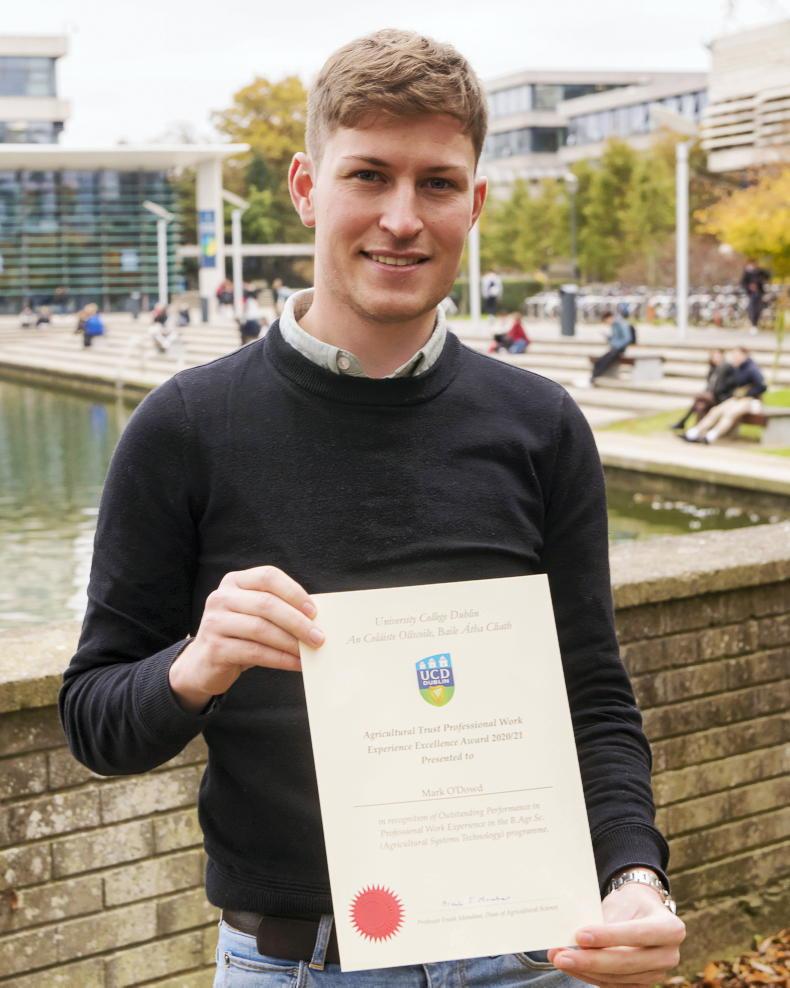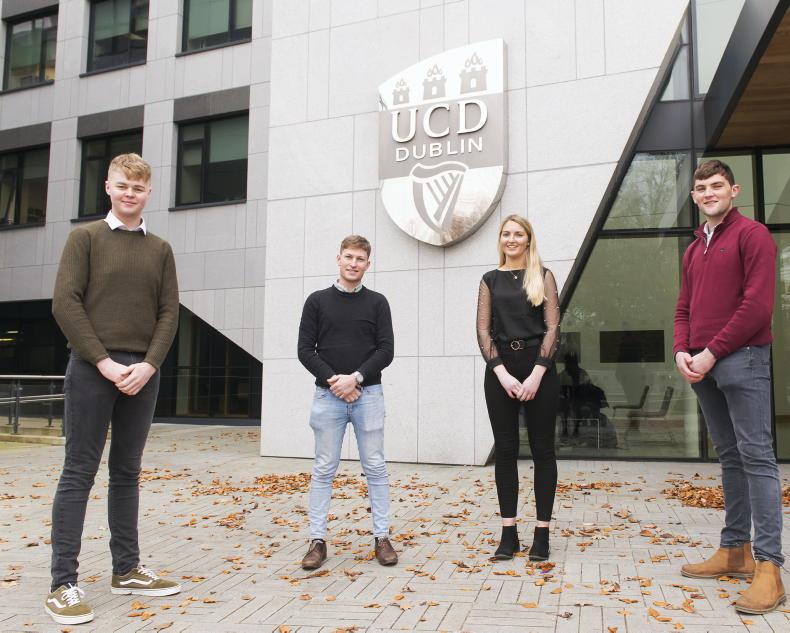It’s been an interesting year for University College Dublin (UCD) Agriculture Systems Technology student Mark O’Dowd; finishing off with a European work placement and an award for his efforts.
Mark was the recent winner of the UCD School of Agriculture and Food Science, Agricultural Trust professional work experience (PWE) excellence award, thanks to the initiative he showed throughout his work placement with Lely at their headquarters in the Netherlands this past spring and summer.
As part of the university course, all students take part in a 16-week work placement which saw Mark pack his bags and head to Rotterdam in March where he completed a two-week quarantine before beginning work for the company.
Dairy innovation
Lely provides innovative solutions to dairy farmers through their robotic milking systems and advanced cleaning systems. It is making a prominent name for itself in Ireland, but Mark wanted to experience the heart of the research and innovation and, as opposed to staying in Ireland for his placement, decided to go straight to the source.

Mark was the recent winner of the UCD School of Agriculture and Food Science, Agricultural Trust Professional Work Experience Excellence award.
“It’s up to the students where they want to go and I obviously wanted to get the best experience possible,” he explains.
Mark’s family farm is not dairying in Cork, they provide a contract-rearing heifer service to dairy farmers, and Mark’s father is also an artificial insemination (AI) technician. It’s through traveling the countryside with his father that Mark’s interest in Lely began.
“I’d go around with him sometimes, and actually see the robots and the systems in place,” he says. “That’s exactly what my course is about in UCD, so I wanted to get experience with that company.”
Rotterdam
“[The Lely factory is] located just west of Rotterdam city – it’s the main factory where they assemble the robots, the Vector feeding systems and a few of their other products,” he explains.
It’s been challenging for anyone to get a normal work experience during the pandemic with all the restrictions in place and added COVID-19 safety measures, but the Netherlands has different restrictions to Ireland. Once the two-week quarantine was complete, Mark was able to make the most of his work and foreign living experience.
I wasn’t working the weekends, so I got to travel around the Netherlands
“I was there until 1 September; it was a full six months really. I loved my time over there and I would go back in a heartbeat. It was definitely an experience,” Mark says.
“I wasn’t working the weekends, so I got to travel around the Netherlands. I hopped on a train and tried to visit a new city every weekend. That was an added bonus of being abroad.”
Varied experience
Obviously, it wasn’t all roaming around the countryside – although Mark did get to visit many farms as part of his working week – but working in a professional office setting was the biggest adjustment.
“I was based with the research and development team of cow monitoring, and I worked on the Vector automatic feeding systems. I got to play with that robot all the time,” he explains.
His working week was a mix of working in the office, working from home and being out on the farm so he got a great experience of working through a pandemic.
I loved going out to the farms
“It was very flexible – the working hours and working locations. It was a great mix and that really kept me interested. Whereas if I’d spent all my time working from home – which I did for college last year – I’d go insane,” he says.
“I loved going out to the farms. I got to visit maybe seven or eight farms when I was out there,” he says.
Culture shock
He noted some marked differences to those back home.
“The Dutch farms are pristine compared to majority of our farms, but I think that’s because they have flat land everywhere and gigantic sheds for everything,” he explains.
“I saw organic dairy systems working in conjunction with these robots, and working amazingly well, and the farmer was selling raw milk directly from his farm,” he says.
“Then I’d go to a farm up the road and they’d have eight or nine of these robots and it would be very intensive dairy farm, proving these robots are really versatile.”
My third-year college experience was spent mainly at home – at the desk, sitting in pyjamas listening to lectures
The whole experience has tempted Mark to study a master’s programme in biosystems engineering in the Netherlands, which would be a complementary extension to his current degree.
“My third-year college experience was spent mainly at home – at the desk, sitting in pyjamas listening to lectures, so that was maybe not the best college experience so hopefully I might be able to make up for that in the future,” he says.
A bright future
Looking further into the future, beyond study, it’s clear Mark is angling for a career in the ag tech sector, and he has his reasons.
“I think agricultural technology and precision agriculture is getting more important by the day really and I want to see it being brought into Irish farms more,” he explains.
He found the farms in the Netherlands far more advanced in tech than back home.
I think technology should be a farmer's friend more than just this huge cost
“Technology can make farms more environmentally conscious and more productive, while being considerate of increasing legislation,” he says.
“I think technology should be a farmer's friend more than just this huge cost – added benefits I think are really, really worth it,” he adds.
Read more
Start-up life in ag tech: advice from Terry Canning - CattleEye
Thinking about an apprenticeship?
It’s been an interesting year for University College Dublin (UCD) Agriculture Systems Technology student Mark O’Dowd; finishing off with a European work placement and an award for his efforts.
Mark was the recent winner of the UCD School of Agriculture and Food Science, Agricultural Trust professional work experience (PWE) excellence award, thanks to the initiative he showed throughout his work placement with Lely at their headquarters in the Netherlands this past spring and summer.
As part of the university course, all students take part in a 16-week work placement which saw Mark pack his bags and head to Rotterdam in March where he completed a two-week quarantine before beginning work for the company.
Dairy innovation
Lely provides innovative solutions to dairy farmers through their robotic milking systems and advanced cleaning systems. It is making a prominent name for itself in Ireland, but Mark wanted to experience the heart of the research and innovation and, as opposed to staying in Ireland for his placement, decided to go straight to the source.

Mark was the recent winner of the UCD School of Agriculture and Food Science, Agricultural Trust Professional Work Experience Excellence award.
“It’s up to the students where they want to go and I obviously wanted to get the best experience possible,” he explains.
Mark’s family farm is not dairying in Cork, they provide a contract-rearing heifer service to dairy farmers, and Mark’s father is also an artificial insemination (AI) technician. It’s through traveling the countryside with his father that Mark’s interest in Lely began.
“I’d go around with him sometimes, and actually see the robots and the systems in place,” he says. “That’s exactly what my course is about in UCD, so I wanted to get experience with that company.”
Rotterdam
“[The Lely factory is] located just west of Rotterdam city – it’s the main factory where they assemble the robots, the Vector feeding systems and a few of their other products,” he explains.
It’s been challenging for anyone to get a normal work experience during the pandemic with all the restrictions in place and added COVID-19 safety measures, but the Netherlands has different restrictions to Ireland. Once the two-week quarantine was complete, Mark was able to make the most of his work and foreign living experience.
I wasn’t working the weekends, so I got to travel around the Netherlands
“I was there until 1 September; it was a full six months really. I loved my time over there and I would go back in a heartbeat. It was definitely an experience,” Mark says.
“I wasn’t working the weekends, so I got to travel around the Netherlands. I hopped on a train and tried to visit a new city every weekend. That was an added bonus of being abroad.”
Varied experience
Obviously, it wasn’t all roaming around the countryside – although Mark did get to visit many farms as part of his working week – but working in a professional office setting was the biggest adjustment.
“I was based with the research and development team of cow monitoring, and I worked on the Vector automatic feeding systems. I got to play with that robot all the time,” he explains.
His working week was a mix of working in the office, working from home and being out on the farm so he got a great experience of working through a pandemic.
I loved going out to the farms
“It was very flexible – the working hours and working locations. It was a great mix and that really kept me interested. Whereas if I’d spent all my time working from home – which I did for college last year – I’d go insane,” he says.
“I loved going out to the farms. I got to visit maybe seven or eight farms when I was out there,” he says.
Culture shock
He noted some marked differences to those back home.
“The Dutch farms are pristine compared to majority of our farms, but I think that’s because they have flat land everywhere and gigantic sheds for everything,” he explains.
“I saw organic dairy systems working in conjunction with these robots, and working amazingly well, and the farmer was selling raw milk directly from his farm,” he says.
“Then I’d go to a farm up the road and they’d have eight or nine of these robots and it would be very intensive dairy farm, proving these robots are really versatile.”
My third-year college experience was spent mainly at home – at the desk, sitting in pyjamas listening to lectures
The whole experience has tempted Mark to study a master’s programme in biosystems engineering in the Netherlands, which would be a complementary extension to his current degree.
“My third-year college experience was spent mainly at home – at the desk, sitting in pyjamas listening to lectures, so that was maybe not the best college experience so hopefully I might be able to make up for that in the future,” he says.
A bright future
Looking further into the future, beyond study, it’s clear Mark is angling for a career in the ag tech sector, and he has his reasons.
“I think agricultural technology and precision agriculture is getting more important by the day really and I want to see it being brought into Irish farms more,” he explains.
He found the farms in the Netherlands far more advanced in tech than back home.
I think technology should be a farmer's friend more than just this huge cost
“Technology can make farms more environmentally conscious and more productive, while being considerate of increasing legislation,” he says.
“I think technology should be a farmer's friend more than just this huge cost – added benefits I think are really, really worth it,” he adds.
Read more
Start-up life in ag tech: advice from Terry Canning - CattleEye
Thinking about an apprenticeship?







 This is a subscriber-only article
This is a subscriber-only article










SHARING OPTIONS: